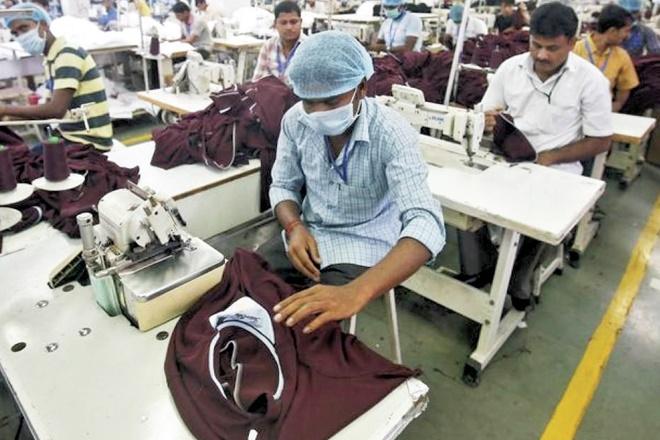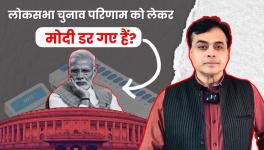Labour ‘Reform’ in India: Worse Than Some Capitalist Nations

Image for representational use only.Image Courtesy : The Financial Express
It is surely a good thing that the metropolitan media have once again picked up the lost trail of rule of law and basic freedoms. But the same media seem utterly unconcerned when it comes to the growing threat to labour rights, which were won through three centuries of unrelenting struggle and now-unimaginable sacrifices.
The annals of labour history, even in India, are filled with ruthless retrenchment, imprisonment, and even death of workers and their leaders in police firing. So when affluent and well-placed people take the moral high ground and preach that labour needs to adjust to demands of the country, it just smacks of gross smugness.
These days “structural adjustments” imposed on a supine Indian leadership by the IMF-World Bank duo go by the name of “economic reform”. The term helps blur the coercive nature of the adjustments imposed by global masters of capital at the expense of the country’s economic sovereignty and hard-worn safeguards for people’s welfare.
Regulations on investment and management were relaxed and corporate firms were allowed to infringe them as long as they made money, and money was simply conflated with real production of goods. The drain of public savings from the banks is just one indication of the unchecked plunder by the corporates in the name of their “ease of doing business”.
Essential goods are now commodities at the mercy of the world market, making a “balanced budget” just impossible for hundreds of millions of homes of the poor.
The last nail on the coffin of people's rights is the labour law “reform”. The government wants to ram through Parliament bills embodying such “reform”, with little resistance as the parliament is now a parliament of crore-patis and the stalwarts of the labour movement no longer have a visible presence or impact on its deliberations. People like HV Kamath, Madhu Dandavate, AK Gopalan and Harkishan Singh Surjit are no longer elected, and the straggling remnant are just listened to with indifference.
On the international arena the scene appears to be just as bleak. The International Labour Organization (ILO) at Geneva came into being two years after the Russian Revolution, perhaps as a cushion on rising labour militancy and influence. It had to work hard to establish its legitimacy and with representation of both state and labour as well as capital, it strove to install certain International Labour Standards (ILS) to guide labour legislation all over the world. Though not mandatory, they had a moral influence and ensured security and welfare for working people.
For instance, one ILS laid down that no worker shall be dismissed from service except on objective and reasonable grounds with the victim entitled to defence against unjust charges. Labour reform now is designed to eliminate just such obstacles to complete domination by capital.
The ILO is now under the influence of resurgent global (imperialist) capital, but while making concession after concession it has not yet knuckled under. But the new and pressing “reforms” Indian rulers are so keen to implement are not suggested by ILO but by organs of global capital such as IMF and the World Trade Organization (WTO), which do not have labour representatives on their boards.
Their war-cry today is “labour-law flexibility”, which glosses over the fact that the flexibility is solely for the benefit of capital. The sanctimonious rule goes that in order to be recognised as a Trade Union, an association of workers in any enterprise must have 75% of workers as members. What on earth is the reason for that? Workers have the constitutional right to organise for the sake of collective bargaining. And recognition of trade unions themselves as representing the interests of labour had been won after more than half a century of arduous struggle and sacrifice. So if membership is 66%, as was the case, or even 50%, how does it fail to qualify as negotiating agency for workers’ dues and rights? And how does it matter if no organisation can claim 66% or 75% membership in the firm, as long as several organisations reach that number together?
The next item on the executioner’s block is security of employment. In the capitalist Utopia, where both capitalist and labourer have equal rights, each has the power to terminate the contract if either thinks terms of contract have not been fulfilled. But in the real world the only guarantee for workers against the greed and cruelty of the capitalist is formal recognition of their employment. Since profit-greedy capitalists would like to hire and fire at will to cut costs and maintain the rate of profit it is the workers’ nightmare. Hence the persistence of the labour demand for security of employment. If it is to be a short-term employment, it has got to be of a reasonable length of time and with decent wages to cover tiding over the period until the next job. Permanent jobs are ideal, but in a private enterprise in a competitive environment it may not be guaranteed. Hence the conditions mentioned above.
This is particularly the case in India where 90% of the jobs are in the so-called “informal” sector. According to ILO figures only 3.80% of the work force in India belongs to the public sector. But that amounts to 69% of the country’s organised labour. For comparison, 16.5% of labour are in public sector in UK, 28% in France, 22.4% in Canada, 15.3% in Germany, 32.9% in Denmark, 35.6% in Norway. So there certainly is room for more employment in the public sector while the government is hell-bent on dismantling the public sector.
In Germany, according to its Employment and Labour Law which came into force this year, all employment requires the mandatory obligation of a signed contract, and even an unsigned contract may be upheld by courts. The contract must mention the date, duration, holidays, working hours, position, pay, leave allowed and sick-pay terms. The right to form unions by labour is a constitutional right. Trade Unions are granted the right to strike when collective bargaining fails. Treatment of contract labour as different from regular employees is prohibited by law. Even when ownership of a firm changes hands, the terms of employment remain unchanged. If a firm employs more than 500 workers, labour has one-third representation on board of management. If more than 2000 then representation on the board is one-half.
Such an example of progressive labour laws is there before us in an indubitably capitalist country. So why should our country be compelled to retreat from such standards?.
The ILO in a resolution adopted as far back as June 1998 laid down that contract labour could not be treated on a different footing from formally recognised labour. They should have the same right of collective bargaining as regular workers. Their wages should be protected as well as proper working hours and statutory social security benefits. The proposed “labour-law flexibility” in our country seeks to do away with all these.
A much-needed protection is recommended by Convention No. 158 of ILO. It ensures that no worker is dismissed for joining a union or working for it outside working hours, or for filing a complaint against the employer for violating labour laws. Only on the basis of outright misconduct, which has to be spelt out, is the employer allowed to terminate the service of an employee.
Such safeguards are being sabotaged in our country under the pretext of “reform”!
The writer is a sociopolitical commentator and literary critic. The views are personal.
Get the latest reports & analysis with people's perspective on Protests, movements & deep analytical videos, discussions of the current affairs in your Telegram app. Subscribe to NewsClick's Telegram channel & get Real-Time updates on stories, as they get published on our website.
















